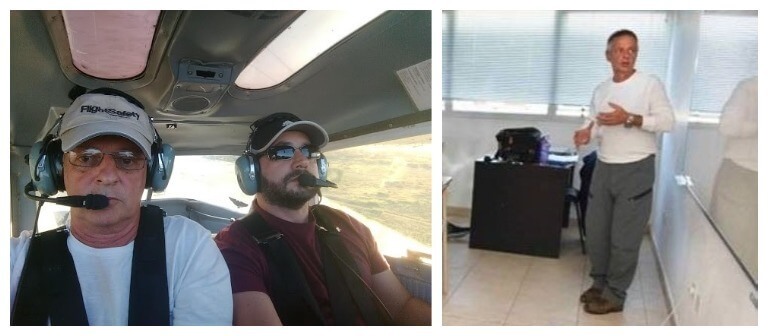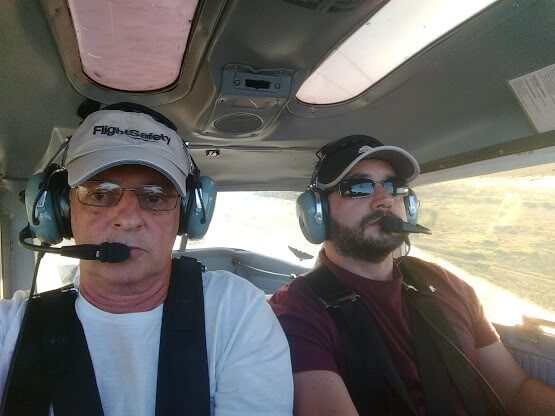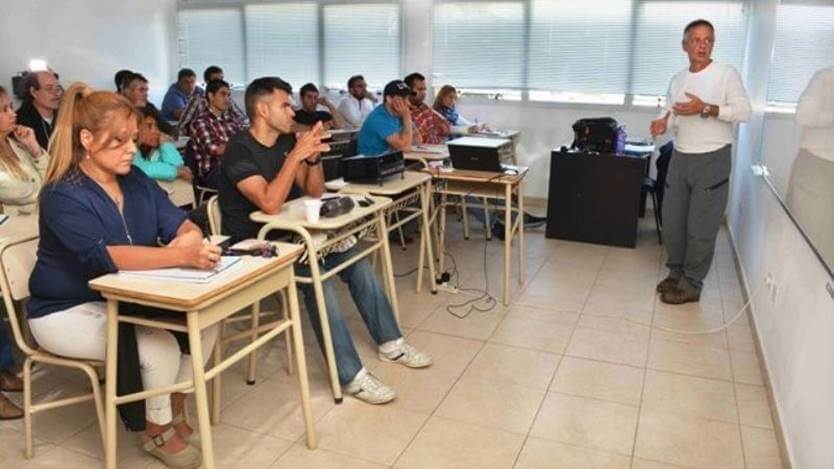Like many people, Marcelo Delsastre, a pilot and flight crew instructor based just outside of Buenos Aires, Argentina, spent most of last year stuck at home telecommuting. But he was also going above and beyond to get himself — and the rest of us — back in the air.
Delsastre, 64, says he never could have guessed that at the end of January 2020, the height of Argentina’s summer travel season, he’d be trading in the airport for Zoom. By the time his vacations were over, however, Argentina had joined much of the rest of the world and locked down to prevent the spread of the coronavirus.
He and his wife, María Alicia, were happy to stay home and take all necessary precautions. But acceptance of the government’s measures was not universal.
“We saw a lot of anger around the world, people protesting,” Delsastre tells AeroTime. “Here, there was a very strong movement that was against the use of the masks. But what do we gain by complaining? My wife and I thought [volunteering for a trial] was a good way we could help. There was a lot of anger and frustration towards the authorities but nobody was doing anything about it.”
When the couple first heard about a clinical trial for a COVID vaccine last year, Argentina was in its first wave of infections. The pair received their two doses in August and September of 2020, Delsastre says. The country’s case rate had taken off at the beginning of Argentina’s winter, in June, and peaked for the first time in October 2020, according to World Health Organization data.
The trial they participated in was a double-blind trial, organized by the government and run out of a military hospital in Buenos Aires. They were picked up at home and brought to the site, first for their shots and then for periodic blood tests, which continue to this day, tracking their antibodies and checking for any new infections.
They were also given mobile phones with an app to track their temperatures on a daily basis and report any potential COVID symptoms, as well as visits to the doctor to rule out any side effects from the vaccines themselves, Delsastre explains. If they marked something down in the app, a doctor working on the trial would call and collect more information. But the results of the regular blood tests weren’t shared with the couple, nor was whether they received actual shots of the vaccine or a placebo.
“The truth is we chose not to wonder if we had received the vaccine or not,” Delsastre says when asked if he felt relief about potentially being vaccinated earlier than most. “We maintained the precautions and continued as if it hadn’t happened.”
That was probably for the best. Delsastre later found out that he had been given the placebo, and his wife had received two shots of the Pfizer-BioNTech vaccine.
In February, when Delsastre was informed that he’d been in the control group, he was given two shots of Pfizer as well. By then, studies showed that the vaccine was safe and effective, and for ethical reasons all participants were offered the vaccine.
Delsastre says he felt fine throughout the trial and has been in good health since getting vaccinated. “It’s not that I seem to be well, I know I am well. Because we pilots need a license and have to have a check-up every six months, it’s a pretty complete inspection.”
In the days to come, both Delsastre and his wife will be administered a third dose of Pfizer as a booster.
As for work, the shutdown in Argentina’s aviation sector during the pandemic was among the world’s most dramatic — and longest. In fact, international commercial flights are only just getting started. The country opened its border to travelers from neighbouring countries on October 1, 2021.
Delsastre said he feels positive that Argentina has moved past the worst of the pandemic, and happily lists the new routes that will soon reconnect the Latin American country to the rest of the region, the United States and Europe. The national airline, Aerolíneas Argentinas, is currently ramping up flights with July 2022 set as the goal for reaching the pre-pandemic frequency of domestic flights.
This is all good news for Delsastre’s work as an instructor at Instituto Argentino de Aviación Civil. More flights mean airlines will be hiring flight crews again, he says. Currently, Delsastre is teaching five courses that are finally in-person, in normal classrooms. During the lockdowns, classes were on Zoom, which only allowed for teaching theory, not all the training required by law. Then there was in-person training but only in huge airport hangers, where students could keep plenty of interpersonal distance but the instruction was more complicated.
With vaccination rates rising and cases falling, some of the restrictions that affected the institute are falling by the wayside. One surprising restriction, or least its connection to aviation, prevented some key instruction from taking place: all swimming pools were closed over concerns about how the virus could spread in water.
That was a big problem when practicing ditching and water survival. Even though the pool they use alongside a Boeing fuselage for training was “not like a resort or anything of the sort,” Delsastre says, it still fell under the regulation. Now that restriction has finally been lifted and they can get back to training.
As happy as Delsastre is about the return to the skies and training the crews headed back to them, the bigger message he wants to share is about vaccination. Since Delsastre and his wife joined the Pfizer trial, vaccine access has become widespread in Argentina. The Argentine Ministry of Health has given emergency authorization to more vaccines than the WHO or EMEA. Kids as young as three are eligible for a shot. As a result, nearly his entire family has been jabbed, even two of his three young grandchildren. Only the youngest, or “más chiquita” at age two, is not yet eligible.
“I would simply recommend to all people that they get vaccinated with whichever vaccine. My family has been vaccinated with the Russian, Chinese, European and American vaccines. All of them have a high efficacy. The worst thing you can do is question the efficacy of the vaccines.”



